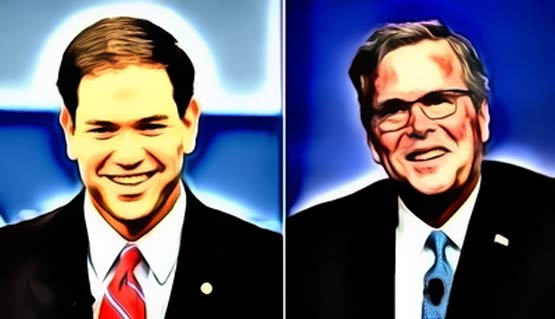
Let's tear our attention away from Donald Trump, if only for a moment, to check in on a psychodrama unfolding way downfield in the Republican presidential race.
I'm talking about the sniping campaign motivated by love gone sour between the two candidates from Florida, Senator Marco Rubio and former Governor Jeb Bush.
Gone is the joy Bush promised he would bring to his quest. It was erased not only by the attacks on his "low-energy" affect from the casino mogul, but because Rubio, his one-time protege, has moved ahead in the national polls. Nowhere is the competition fiercer than in their home state, where they are battling for the same donors and voters in a make-or-break contest for the 99 delegates in the March 15 primary.
Rubio is trying to present himself as the anti-Bush: The fresh face who is acceptable to the social conservative base, Tea Party activists and the hair-on-fire Republican establishment. Rubio hammers home the point that he, at 44, is "a generational choice."
That his target is Bush, 62, is unmistakable. "This election cannot be one of those elections where we just promote the next person in line, where we just vote for the person the experts tell us we have to vote for," Rubio said recently.
Youth versus experience has become their sparring ground. On MSNBC's "Morning Joe" on Oct. 1, Bush was asked whether Rubio had the "leadership skills to fix things." Looking pained, the elder statesman responded: "It's not known. Barack Obama didn't end up having them and he won an election based on the belief that people had that he could and he didn't even try."
When third-quarter fundraising figures were released last week, Rubio's campaign crowed that its candidate had "more money in the bank" than Bush. Tim Miller, Bush's communications director, fired back on Twitter, asking if Rubio's boast of frugality accounted for "$6 million in secret money TV ads they saved money on."
The previous day, Bush's son, Jeb Bush Jr., had weighed in on Rubio's spotty attendance record in the Senate: "He's missing, like, 35 percent of his votes," he said. "And it's just, kind of, like, dude, you know, either drop out or do something, but we're paying you to do something. It ain't run for president."
It shouldn't be surprising that this competition has taken on such a nasty personal tone. Bush and Rubio once were brothers-in-arms. In 2005, the then-governor presented Rubio with a ceremonial sword upon his becoming speaker of the Florida House, comparing Rubio to Chang, the mystical warrior, who "has never let me down." In Rubio's 2012 memoir "An American Son," he praised Bush "as the man I most admired in Florida politics." Rubio was one of the first people Bush told he was forming an exploratory committee.
That didn't stop Rubio from getting in the race. The two said they would remain friends, but in February Rubio cautioned against exaggerating the depth of the relationship. "I never worked for him," he said.
Trump, with his keen appreciation for an opponent's soft underbelly, has fed the flames. "They hate each other," he said in New Hampshire this month. "They hate. Trust me. I know. They hate so much."
This political and personal strain must have a feeling of déjà vu for Jeb, who worked hard, played by the rules, and climbed the party ladder as the son destined to follow in dad's footsteps. George W. was the cut-up, coasting through school, floating through oil busts, and partying until he gave up drinking after his 40th birthday. As Jeb lost his first race for Florida governor, W. won his in Texas, and Barbara Bush would exclaim, "Can you believe it?"
By dint of self-abnegation, Jeb, now governor, made it through the 2000 presidential campaign, introducing W. as "my older, smarter and wiser brother" and W. joking that Jeb would be washing his car if he didn't deliver Florida. When W. won, but then didn't, Jeb tried to leave the recount debacle to his secretary of state, Katherine Harris. He eventually dove in and his poll numbers dropped. "I can't recuse myself from my constitutional duties as governor," he said, "and I can't recuse myself frankly of being my brother's brother, either."
In this campaign, some of Bush's most uncomfortable moments have been attempts to deal with W. He would have voted for the Iraq war; no he wouldn't have. He's his "own man," but persists in defending his brother, who "kept us safe." The surge was brilliant and it is President Barack Obama, not the Bush administration, who is to blame for the mess in the Middle East.
We remain captives of our family history long after we leave home. Some of Bush's resentments are now being displaced onto Bush's erstwhile friend, Rubio, who jumped the line, just as W. did. More subtle than Bush in his criticism, Rubio has nonetheless drawn the sword Bush honored him with.
As so often, Florida will be crucial. Defeat for Bush there would be lethal. At the hands of Rubio, it would be tragic as well.
Previously:
• 10/12/15: Hillary's fake transparency has visible seams
• 08/10/15: Predictions of Trump's death were exaggerated
• 07/27/15: Kasich's Republican path to the White House
• 06/15/15: Hey, Democrats, have you forgotten Joe Biden?
Comment by clicking here.
Margaret Carlson is a Bloomberg View columnist. A former White House correspondent for Time, she was also Time's first female columnist. She appeared on CNN's "Capital Gang" for 15 years. A former editor at the New Republic, Carlson has been a fellow at Harvard University's Institute of Politics, a Poynter Fellow at Yale University and a journalist-in-residence at the University of Notre Dame.



 Contact The Editor
Contact The Editor
 Articles By This Author
Articles By This Author